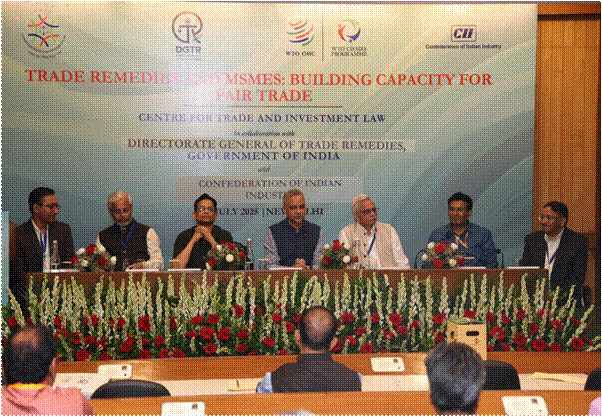Workshop Empowers MSMEs on Trade Remedies and Fair Trade Mechanisms
In his keynote address, Shri Siddharth Mahajan, Joint Secretary & Director General, DGTR, underscored the importance of collective representation by MSMEs.

- Country:
- India
In an effort to fortify the capabilities of India’s Micro, Small, and Medium Enterprises (MSMEs) against unfair trade practices, the Centre for Trade and Investment Law (CTIL) at the Indian Institute of Foreign Trade (IIFT), in collaboration with the Directorate General of Trade Remedies (DGTR), Department of Commerce, and the Confederation of Indian Industry (CII), organized a high-impact workshop titled “Trade Remedies and MSMEs: Building Capacity for Fair Trade.” The event was held at the prestigious India Habitat Centre, New Delhi, on July 15, 2025.
This one-day workshop was designed to sensitize, inform, and empower MSMEs by equipping them with practical knowledge and tools to safeguard their interests in the global trade landscape—particularly against dumping, subsidized imports, and other unfair trade practices that pose challenges to India’s domestic industries.
Focus: Building MSME Capacity for Trade Remedy Participation
The central theme of the workshop revolved around enhancing MSMEs' understanding of trade remedy frameworks—such as anti-dumping duties, countervailing duties, and safeguard measures—and encouraging their active participation in investigations under India’s trade remedy regime.
The initiative brought together a diverse group of participants, including:
-
Policy makers
-
DGTR officials
-
Legal and economic experts in trade law
-
MSME entrepreneurs
-
Industry association representatives
The sessions focused on:
-
Understanding legal and procedural frameworks
-
Navigating data and documentation challenges
-
Institutional support mechanisms for MSMEs
-
Practical case studies and remedies available under WTO-compliant frameworks
DGTR Emphasizes MSME Collaboration and Legal Readiness
In his keynote address, Shri Siddharth Mahajan, Joint Secretary & Director General, DGTR, underscored the importance of collective representation by MSMEs. He stressed that smaller firms often lack the resources to engage in complex trade remedy proceedings individually and recommended forming associations or consortia that can act collectively to file and pursue trade remedy cases.
He noted, “Trade remedies are only effective if the industry participates proactively. For MSMEs, collaboration is not just desirable—it is essential.”
Expert Insights from Trade Remedy Veterans and Global Institutions
The workshop featured prominent voices in trade policy:
-
Shri Anant Swarup, Former Additional Secretary & DG, DGTR, spoke about the evolution of India’s trade remedy infrastructure, highlighting the shift toward greater accessibility for smaller firms.
-
Mr. Andrea Mastromatteo, Director, Rules Division, WTO, brought an international perspective, offering insights on how MSMEs in developing countries can better align with global trade rules and make full use of the remedies available under WTO frameworks.
Their contributions shed light on global best practices and India's growing alignment with international standards for fair trade.
Institutional Support through CTIL and TRAC
Prof. James J. Nedumpara, Head of CTIL, introduced participants to the Trade Remedies Advisory Cell (TRAC)—an initiative aimed at handholding MSMEs through the procedural and legal complexities of trade remedy investigations. He emphasized that the TRAC functions as a one-stop support system, helping firms prepare documentation, assess viability, liaise with DGTR, and understand regulatory requirements.
He reiterated CTIL’s commitment to building legal literacy in the MSME sector and enhancing their access to justice under trade remedy laws.
CII Highlights Industry’s Role in Addressing Trade Distortions
Shri Sumanta Chaudhuri, Principal Advisor, International Trade Policy Division, CII, addressed the workshop, noting the rising complexity of the global trade environment and the increasing instances of trade distortions due to aggressive subsidization and dumping by foreign exporters. He called for institutional coordination and sustained capacity building, especially in labor-intensive sectors vulnerable to import competition.
Real-World Engagement with MSMEs
The workshop culminated in a vibrant interactive session between MSME stakeholders and regulatory authorities. Entrepreneurs candidly shared challenges faced during trade remedy processes, including:
-
Limited awareness of rights
-
Inadequate legal resources
-
Complex data requirements
-
Prolonged investigation timelines
Sectors such as textiles, electronics, packaging materials, steel products, and chemicals reported acute stress from low-priced imports, urging regulators for faster redressal and simplified procedures.
This dialogue allowed officials to gain real-time insights into ground-level bottlenecks and gather feedback on improving trade remedy support systems.
Reaffirming Commitment to Fair Trade
The workshop concluded with a joint commitment by CTIL, DGTR, and CII to:
-
Enhance outreach to MSMEs through training and awareness campaigns
-
Facilitate timely and effective access to trade remedy mechanisms
-
Ensure institutional collaboration across government, academia, and industry bodies
By bridging knowledge gaps and fostering confidence among MSMEs, this collaborative effort aims to create a more inclusive and resilient trade remedy regime—empowering small businesses to not only survive but thrive in a competitive global marketplace.










